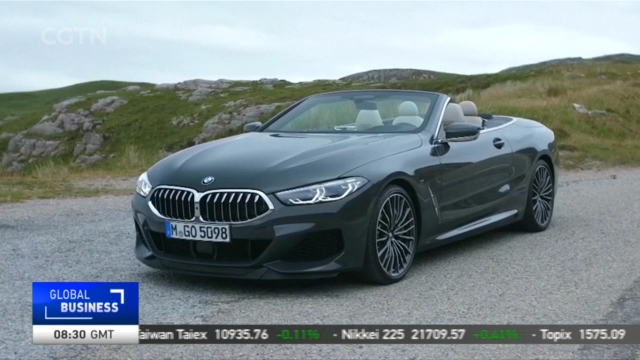
16:55, 24-Jul-2019
China Auto Check: New tech race in a more open market
Updated
17:11, 24-Jul-2019

Germany will host the third Germany-China Automobile Congress in September, a widely watched event amid the current global trade uncertainties. The Chinese auto market continues to top the world's auto sales, especially for luxury cars. But, as the Chinese auto market embraces more foreign capital, where should global automakers look at first? CGTN's Xia Cheng reports.
A more open Chinese auto market, and a more divided one in terms of what consumers want. Electric vehicles are a focus. First, it's a priority for China to improve the environment. Second, it's part of China's drive to further open up its markets. Last year, China removed ownership caps for foreign carmakers' China ventures in EV and plug-in hybrids. Caps on commercial vehicle makers will ease in 2020 and by 2022 for the wider car market.
MINGYU GUAN, PARTNER McKINSEY & COMPANY "As you know, every OEM has its local partner, being SOEs or some of the private companies. I think the question is really what is the value add or what is the value they can continue getting from their local partners."
So far, besides a fully owned Shanghai factory by Tesla, most global auto brands have been continuing their partnership strategy. BMW is working with Tencent to open a computing center in China for self-driving cars. Toyota is planning to develop electric vehicles and batteries with Chinese EV giant BYD. And Beijing Auto just bought another 5% stake in Daimler, seeking joint efforts in new auto technologies. Are we going to see more to come?
MINGYU GUAN, PARTNER McKINSEY & COMPANY "In the past, I think, it was pretty much setting the plant. But you are also seeing that there's more and more move for those international players putting their research and development centers in China, really moving part of their technology and engineering team locally. So I think it's probably gonna be a good mix of very high-end technology, but you still want local partners to basically get into the manufacturing or basic operation side."
XIA CHENG BEIJING "Luxury car sales have stayed strong in China this year even as overall car sales have declined. We are talking about car buyers in top cities like Beijing, Shanghai and Guangzhou. That's where foreign brands shine. But that's not the case in much smaller cities, not even Wuhan, Nanjing or Chengdu, but those much lower tiers cities that you might've never heard of. They are the home turf for Chinese automakers. Those cities have just gone through a burst of housing bubble, because the local economies and spending power cannot support more home purchases. So when housing is down, will auto be next?"
MINGYU GUAN, PARTNER McKINSEY & COMPANY "I would say there's also a shift from the consumers about what cars they actually want. So to your point, I think some of the OEMs, if they originally focus on certain part of the market, probably do have to prepare themselves and say how or when is the migrating path in order to really not being falling behind the overall trend in the market."
Analysts believe that even entry-level cars can be lucrative in a weaker Chinese market, as long as those cars are geared with the right tech features. That's because they believe that Chinese car buyers are still trading-up. And we are likely to see more global automakers checking the low- or zero-emission, low price point, and high tech boxes when launching products and setting up factories in China. XC, CGTN, BEIJING.
SITEMAP
Copyright © 2018 CGTN. Beijing ICP prepared NO.16065310-3
Copyright © 2018 CGTN. Beijing ICP prepared NO.16065310-3